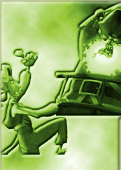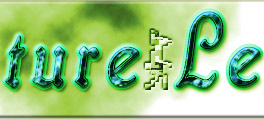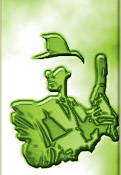
|
This accommodates the creation of cross-platform and multi-genre video games using a custom drag-and-drop visual programming language or a scripting language known as Game Maker Language, which can be used to develop more advanced games that could not be created just by using the drag and drop features. GameMaker was originally designed to allow novice computer programmers to be able to make computer games without much programming knowledge by use of these actions. Recent versions of software also focus on appealing to advanced developers. It's primarily intended for making games with 2D graphics, allowing out-of-box use of raster graphics, vector graphics (via SWF), and 2D skeletal animations (via Esoteric Software's Spine) along with a large standard library for drawing graphics and 2D primitives. While the software allows for use of 3D graphics, this is in form of vertex buffer and matrix functions, and as such not intended for novice users. The engine uses Direct3D on Windows, UWP, and Xbox One; OpenGL on macOS and Linux; OpenGL ES on Android and iOS, WebGL or 2d canvas on HTML5, and proprietary APIs on consoles. The engine's primary element is an IDE with built-in editors for raster graphics, level design, scripting, paths, and shaders (GLSL or HLSL). Additional functionality can be implemented in software's scripting language or platform-specific native extensions. Versions below 5.0 have been freeware; version 5.1 introduced an optional registration fee; version 5.3 (January 2004) introduced a number of new features for registered users, including particle systems, networking, and possibility to extend games using DLLs. Version 6.0 (October 2004) introduced limited functionality for use of 3D graphics, as well as migrating the runtime's drawing pipeline from VCL to DirectX. Growing public interest led Overmars to seek help in expanding the program, which led to partnership with YoYo Games in 2007. From this point onward, development was handled by YoYo Games while Overmars retained a position as one of company's directors. Version 7.0 was the first to emerge under this partnership. Version 8.1 (April 2011) sees the name changed to GameMaker (lacking a space) to avoid any confusion with the 1991 software Game-Maker. This version also had the runtime rewritten in C++ to address performance concerns with previous versions. September 2011 sees the initial release of "GameMaker: HTML5" - a new version of software with capability to export games for web browsers alongside with desktop. GameMaker: Studio entered public beta in March 2012[38] and enjoyed a full release in May 2012. In February 2015, GameMaker was acquired by Playtech together with YoYo Games. Announcement reassured that GameMaker will be further improved and states plans to appeal to broader demographic, including advanced developers. November 2016 sees the initial release of GameMaker Studio 2 beta, with full release in March 2017. This version spots a completely redesigned IDE (rewritten in C#[48]) and a number of new editor and runtime features. |








